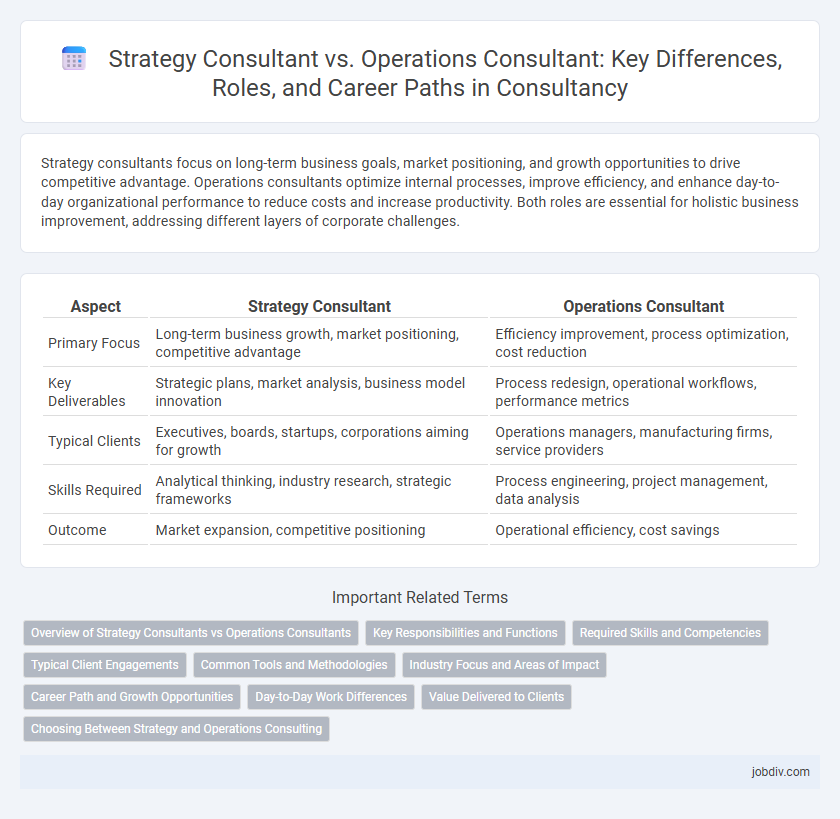Strategy consultants focus on long-term business goals, market positioning, and growth opportunities to drive competitive advantage. Operations consultants optimize internal processes, improve efficiency, and enhance day-to-day organizational performance to reduce costs and increase productivity. Both roles are essential for holistic business improvement, addressing different layers of corporate challenges.
Table of Comparison
| Aspect | Strategy Consultant | Operations Consultant |
|---|---|---|
| Primary Focus | Long-term business growth, market positioning, competitive advantage | Efficiency improvement, process optimization, cost reduction |
| Key Deliverables | Strategic plans, market analysis, business model innovation | Process redesign, operational workflows, performance metrics |
| Typical Clients | Executives, boards, startups, corporations aiming for growth | Operations managers, manufacturing firms, service providers |
| Skills Required | Analytical thinking, industry research, strategic frameworks | Process engineering, project management, data analysis |
| Outcome | Market expansion, competitive positioning | Operational efficiency, cost savings |
Overview of Strategy Consultants vs Operations Consultants
Strategy consultants specialize in high-level business planning, focusing on market analysis, competitive positioning, and long-term growth initiatives to drive organizational success. Operations consultants concentrate on improving internal processes, supply chain efficiency, and day-to-day operational performance to enhance productivity and reduce costs. Both roles require analytical expertise but differ in scope, with strategy consultants shaping future direction and operations consultants optimizing current business functions.
Key Responsibilities and Functions
Strategy consultants analyze market trends, competitive positioning, and business models to develop high-level plans that drive long-term growth and organizational change. Operations consultants focus on improving internal processes, supply chain management, and efficiency to enhance day-to-day performance and reduce costs. Both roles demand strong analytical skills but differ in scope, with strategy consultants targeting overarching goals and operations consultants emphasizing execution and operational excellence.
Required Skills and Competencies
Strategy consultants require strong analytical skills, strategic thinking, and expertise in market analysis to develop long-term business plans and competitive positioning. Operations consultants focus on process optimization, supply chain management, and efficiency improvement, necessitating skills in workflow analysis, project management, and operational technologies. Both roles demand excellent communication, problem-solving abilities, and adaptability to drive organizational performance and change.
Typical Client Engagements
Strategy consultants primarily engage with clients on high-level business challenges such as market entry, growth strategies, and competitive analysis, usually collaborating with C-suite executives to shape long-term organizational direction. Operations consultants focus on optimizing internal processes, supply chain efficiency, and cost reduction, often working closely with mid-level managers and operational teams to implement practical improvements. Both types of consultants tailor their approach based on industry-specific needs, ensuring alignment with the client's key performance indicators and business objectives.
Common Tools and Methodologies
Strategy consultants primarily utilize tools like SWOT analysis, Porter's Five Forces, and Balanced Scorecards to evaluate competitive positioning and formulate growth strategies. Operations consultants focus on Lean Six Sigma, value stream mapping, and process reengineering to enhance efficiency and optimize workflows. Both roles leverage data analytics and stakeholder interviews to inform decision-making and drive organizational improvements.
Industry Focus and Areas of Impact
Strategy consultants primarily target high-level industry sectors such as finance, technology, and healthcare, driving initiatives around market entry, competitive positioning, and long-term growth planning. Operations consultants focus on sectors with complex supply chains and manufacturing processes like retail, logistics, and automotive, optimizing operational efficiency, process improvements, and cost reduction. Both roles significantly impact organizational performance but differ in scope, with strategy consultants shaping corporate direction and operations consultants enhancing day-to-day business functions.
Career Path and Growth Opportunities
Strategy consultants typically focus on high-level business decisions, market analysis, and long-term planning, often progressing towards roles in executive leadership or corporate strategy divisions. Operations consultants concentrate on improving internal processes, supply chain management, and operational efficiency, with career growth typically leading to roles such as operations manager, supply chain director, or process improvement leader. Both paths offer strong career development, but strategy consulting tends to emphasize strategic influence and decision-making, while operations consulting prioritizes hands-on implementation and operational expertise.
Day-to-Day Work Differences
Strategy consultants focus on high-level business planning, market analysis, and long-term growth initiatives, often working with C-suite executives to design frameworks for competitive advantage. Operations consultants concentrate on optimizing internal processes, supply chain management, and efficiency improvements, collaborating closely with mid-level managers and frontline teams to implement practical solutions. The day-to-day work of strategy consultants involves data-driven research and scenario modeling, while operations consultants engage in process mapping and hands-on problem-solving within organizational workflows.
Value Delivered to Clients
Strategy consultants deliver value by identifying growth opportunities, shaping long-term business plans, and driving competitive advantage through market analysis and innovation. Operations consultants optimize internal processes, improve efficiency, reduce costs, and enhance supply chain management to increase operational performance. Clients gain strategic foresight from strategy consulting and tangible improvements in day-to-day business functions from operations consulting, aligning organizational goals with actionable solutions.
Choosing Between Strategy and Operations Consulting
Choosing between strategy consulting and operations consulting depends on your career goals and skill set. Strategy consultants primarily focus on high-level business decisions, market entry, and growth strategies, requiring strong analytical and problem-solving abilities. Operations consultants concentrate on improving internal processes, supply chain management, and efficiency, making them ideal for those skilled in process optimization and project management.
Strategy Consultant vs Operations Consultant Infographic

 jobdiv.com
jobdiv.com